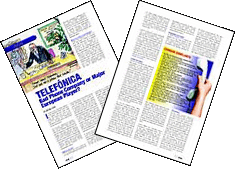


Telefónica, bad phone company or major European player?
In recent times, high-flying Telefónica has frequently been in the news for daring take-over bids both locally and abroad. For many of the company's users, however, it seems hard to reconcile such international ambitions with the level of service they are accustomed to.
As a company, Telefónica is a paradox. Ask most people in Spain what they think of Telefónica and its service, and the response-especially from the foreign community-will be negative. While it is almost traditional to complain about phone companies, the railways and the postal service, it seems that many have a bone to pick with Spain's largest telecommunications company and few are entirely satisfied with it-with the exception of its sharholders, of course.
Mañana service?
A lot of people who come to Spain do so in the firm belief that everything here is ten years behind and that the national motto, particularly when it comes to work, is mañana. While they would be surprised if they settled in Madrid or Barcelona, those who visit the previous outposts now known as the Costas will often find reason to confirm their preconceptions. In spite of the obvious rate of development in Spain, the pace is slower and notions of service and customer satisfaction are still rather new in these southern parts of Spain. However, Telefónica is not a small local firm but a huge Madrid-based corporation that is building a telecommunications and media empire on its foundations as the former state telephone monopoly.
To anyone who keeps an eye on the stock movements and the financial news, let alone has visited company headquarters in Madrid, this is definitely not a sleepy mañana operation. In its financial management, Telefónica is run like any European or American blue-chip company, employing clever market strategies, aggressive marketing and heavy investment in technology and product development. In short, it is one of the leading lights of Spanish economic development, so why do complaints and tales of woe about Telefónica's standard of service abound among foreigners and Spaniards alike?
Complaints
'Because it's a monopoly', say some. Indeed, as a product of the privatisation drive of the 1980s and 1990s, Telefónica is the direct descendant of the state-owned telephone company that held the monopoly in Spain for so long. In most countries, this transition from state-supported service company to profit-making private concern, answerable not to national infrastructural interests but to its shareholders instead, has been a relatively smooth one, cushioned by a buffer period during which the companies were in the enviable overlap stage between free market trading and state protection. The latter consisted mostly of continued financial underwriting and the continued monopoly over the country's telecommunications infrastructure, and the main difference between countries has been the period of time allotted for this happy state of affairs. As an eager disciple of monetarism, Britain made the transition more swiftly than the likes of France, Holland, Italy and Spain, where a tendency towards protectionism still exists.
Eventually Spain, like all the other countries in the EU, opened its market to competing telephone operators and service providers, yet while both national and foreign competitors are now free to exploit the Spanish market, they are still dependent on one company for the infrastructure they use. You've guessed it, Telefónica.
© Michel Cruz





